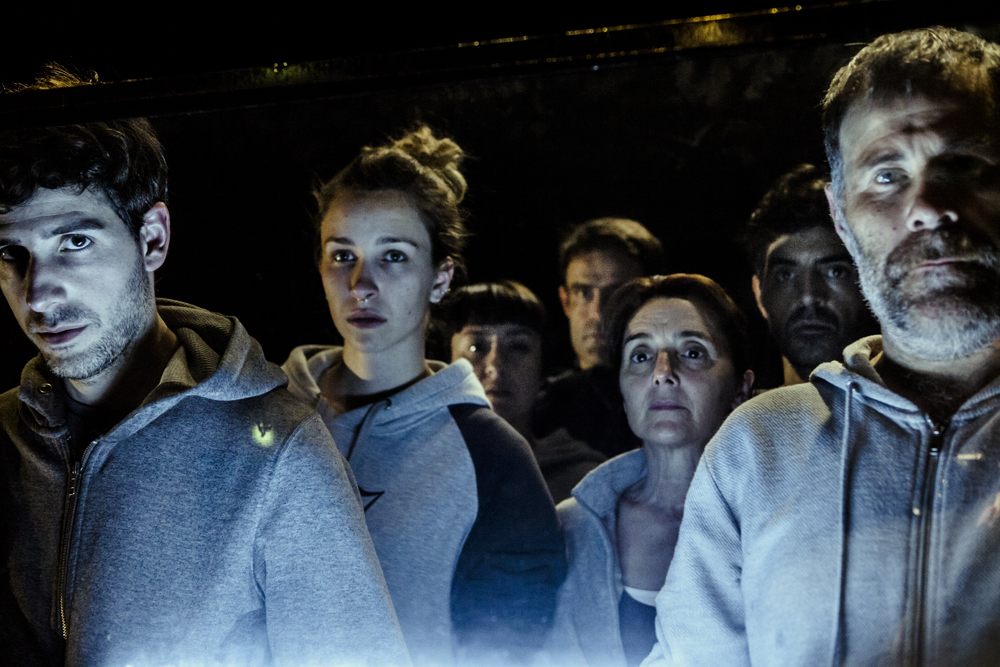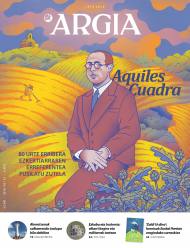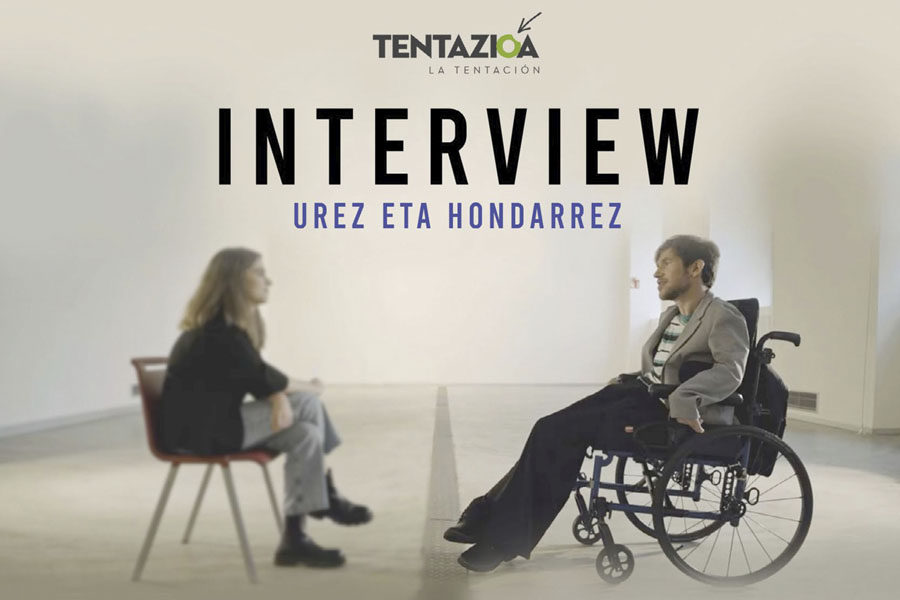Heroin massacre on the deck
- Drugs, but not substance in itself. The drug in the Basque Country: the mark it has left, the one that has been preserved in memory, the one that has influenced families, the one that has remained silent and the one that is still alive. That's what it is. We refer to the play Zaldi urdina, created jointly by Axute, Dejabu and Artedram. The premiere of the film is scheduled for 11 October in Luhuso.

It is the fourth time that the theatre companies Axut, Dejabu and Artedrama work together. The ashes, the letter to the grandson of Hamlet and Franco are some of the titles of the previous works. They tend to approach the past and bring to the present all the topics they deal with, in order to tell the reality of Euskal Herria and place the public in it. This last work is also built on the same bases.
A family is the protagonist, “the smallest metaphor” of Basque society. They follow the youngest in the family who has committed barbarism. “We want to tell what we saw, heard or met decades ago, in groups and beyond. That in Euskal Herria a great deal of drugs was unexpectedly introduced and that caused a great massacre,” said Director Ximun Fuchs. In addition, he added that it will be a “hard and hard” work, because we will find the history of Euskal Herria, which has left a lot of stigma and shame in many families: "There have been thousands of deaths, many people have been infected with AIDS and they don't know. There are things that are heard right and left that come back: heroin comes back, especially in the capitals, but not only. This has happened, it still happens. It is very easy to take all kinds of drugs in the Basque Country. I’ve walked through France and it’s not that easy.”
The playwright added that it can be the last massacre in Euskal Herria and that it has something to tell about society and the Basque character: “This is the massacre we have within us. It is not old, it can be considered a personal error, but there is something that can be analyzed collectively.” However, they will not make any judgment on drugs, but will count the most crude side of reality and, at the same time, the most beautiful, cultivating the human: “The most difficult task is to accept our contradictions, to put them very clearly in order to generate a debate. In this way, it is about asking questions, not saying ‘this is good and this is bad’. We hope that, in addition to pleasure, there will be a debate in society, that moves, that emotion, the roots of the public. That everyone can say ‘I’m going around’ or ‘I see my cousin or my grandmother and I want to have the opportunity to understand myself’”.
Although they have taken many steps to reach the point where they are located, Ainara Gurrutxaga, director of the work, explained that until the release day they will continue searching for poetic and staging.
Ximun Fuchs: "The Basque parties are missing, i.e. those who love the country and those who think that they should continue to feed," he added. For that you need a Basque art"
Working on popular memory
“Everything starts with an intuition,” says Fuchs, “Our pretension is to tell the taste of the air. What is troubling, what is quiet, what can go well today.” By pulling this thread, they started documenting here and there. Gurrutxaga has reported that he has been very inspired by the arts around him. In addition, he cited the book of Uxue Alberdi Jenisjoplin and the mamarro Zaldi of Ekaitz Goienetxea, since they are stories that happen at that time and that point to the need to reflect on drugs. In terms of aesthetics, The Lady from Shanghai, by Orson Welles, and the Twist novel by Harkaitz Cano, among others, stand out. He added that electronic music has also inspired the French, The Blaze, among others. And one of the pillars of the work has been the book of Justo Arriola At the foot of the horse, hence the entire work of documentation has begun. “We talked to each other and we all wanted to follow. Then we began to search in the literature, to chat with our acquaintances and relatives; we also talked to the Ai Laket group and we tried to create a network to work with the popular memory. Not historical memory, but popular,” says Fuchs.
They have stressed that our history has been conveyed orally: “The theater continues to transmit, keeping the popular memory alive. There’s a lot of material to tell.” Therefore, they have explained that, just as they did with the play Carta to Franco's grandson, they will collect all the material on the web, they will open a section so that people can continue to deepen.
The Mystery of Theatre
To convey all this, they have made a fiction using the tools of the theater: “We tell stories, because that leads to metaphors, to symbols. We do documented theater, but not documentary,” explains Fuchs. “One of the most beautiful aspects of theatre is a mystery to me. Of course there are many techniques: actors, writers, music, but there's always something very mysterious. What we bring to the stage is what can hardly be said with words,” added Gurrutxaga.

Everything you want to express begins to emerge from intuition without knowing what form you will adopt. Unlike conventional or classical theater, the script is created in the essays themselves. Gurrutxaga has stressed that the two writers of the work, Igor Elortza and Unai Iturriaga, have been with them in the process: “We always do so in parallel. Create, revise and reconstruct texts from improvisations. The writers are next to this process, they don't immediately write all the work. We wrote some scenes, we tried them onstage and exchanged opinions.”
It is the fourth time that the three companies have been set up to create together, as has been mentioned. Although each creator has its own identity, they have similar goals and some characteristics that unite them. Thus, they say they admire the work of the other: “The way to create Artedrama, Dejabu and Axuten is not strategic. We don't think we're going to make political theater. In Dejabu, for example, the political and historical context is always of great importance. Surely, as an individual, because it's very important. At the same time, we are very fond of poetry and flying fills us with fear. We are going to look for that mystery,” said Gurrutxaga. In addition, he added that, without believing much in the casualties, they met "because yes," because "he needed it."
In search of the possibility of
The fact that Euskal Herria is small gave them the opportunity to meet each other years ago. According to Fuchs, at that time in the theater there was a small moment of crisis. They also believed and set to work on the possibility of breaking the molds a little, not only artistically but also economically. One of the consequences of this fusion was to think of a project at the level of the Basque Country.
“The theater is a forum that is offered to the people, where we gather together a whole collective, a whole village; children, youth and adults, different culture and trades.” Fuchs added that, in addition to sharing, they meet to exist: “As Basques we have no space to exist and the theater gives the opportunity. We are seeing, living, feeling, sharing our history, because it is not told, we do not exist as a people.” They have added that the Basque art has always been that, the moments of assembly, freedom, dancing and doing together: liberties, berets, horseback riding. They've been passed down from generation to generation through the body and orality. “We live without thinking like Basques and Basques. It feeds physical language, spoken language and collective imaginary, and that's what we do."
On many occasions, however, one has to go against the current to be able to go out to the plaza: they denounce the loophole that exists with regard to the Basque Country and the Basque culture, and in general with regard to culture. Fuchs says: “There is a lack of political thinking for culture. Think about what we want to do, not what we can get. What we want to be. On the left, on the right or in the middle there is no political thought for the Basque culture if it is not welfare or leisure, but that is not effective. That doesn't create an economy, it doesn't create a country. For me, there is a lack of nationalist parties, that is, those who love the people and think that they should be fed. This requires a Basque art.” Gurrutxaga recalled that in the 1960s there was already this debate about the need for the Basque art schools themselves: “He’s standing for the past 20 years.”
“About 50 professional Basque theatre companies and 40 creations remain to be seen in any village. People could make critical choices and create a popular aesthetic. Small peoples have a personality, but they feed it.” They talk about the role of those who have power and not, those who have power, those who have to give the same money to their works in Spanish and Basque, because it is very false and bourgeois. “What needs to be done is to feed our people. Theater, cinema. We have enough strength and money. Basque Country is not poor. Just look at the freeway that goes from Bilbao to the North. This is ours and if we lose we will be from the forest, not Basque. We have to decide whether we are from the forest that we want to be. Or die, simply, and bury our immaterial heritage, that is, our true wealth.” They claim that not feeding all of this makes us mere consumers, a loss of identity: “We and an American have the same personality; the same suit, the same way of eating, of loving, of thinking. That is, nothing.”
Gurrutxaga has also welcomed the flourishing of the young theatre companies. He says they do theater because they love art, Euskera and life, beyond what they have to do and the victim's perspective.
I'm talking about Interview. With water and sand
Authors: Telmo Irureta and Mireia Gabilondo.
The actors: Telmo Irureta and Dorleta Urretabizkaia.
Directed by: Assisted by Mireia Gabilondo.
The company is: The temptation.
When: April 2nd.
In which: At the Victoria Eugenia... [+]
ERREALITATEAREN HARRIBITXIAK
Nork: Josu Iriarte, Nerea Lizarralde, Jare Torralba eta Amets Larralde. Mikel Martinezek zuzenduta eta Jokin Oregiren testuetatik abiatuta.
Noiz: otsailaren 21ean.
Non: Bilboko 7katu... [+]
Vagina Shadow(iko)
Group: The Mud Flowers.
The actors: Araitz Katarain, Janire Arrizabalaga and Izaro Bilbao.
Directed by: by Iraitz Lizarraga.
When: February 2nd.
In which: In the Usurbil Fire Room.












